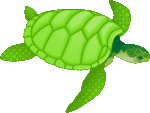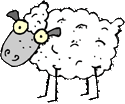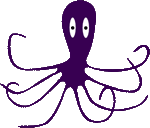

Certainly,
this kind of reverence for other life forms has existed for many
centuries (several eastern religions [loosely] espouse this paradigm,
such as Buddhism and Jainism), but the industrial revolution has  made
paradigm even more compelling. With industrialization and capitalism comes the
maximization of profit and
thus the minimization of expense. This created the massive industrial
complexes used for most meat, egg and dairy production. Thousands of
animals are crammed into holding areas with little or no room to move,
let alone live a life. Billions of animals are slaughtered each year
for human convenience and pleasure. Picture-book family farms where the
chickens, pigs and cows can roam around the yard/pasture freely are far
from the norm. To large agribusiness [factory farms], animals are no
different than toilet paper, just a product to pump full of chemicals,
cut-up and sell. These processes have been hidden from the public eye,
which encourages extreme detachment from these productized animals.
Most people have never witnessed an animal slaughter and think nothing
of the origins of the meat they are eating, unlike the olden days when
the meat most likely would have come from a nearby farm (and thus at
least there was a glimmering of awareness). Sadly, most animals today
are slaughtered by some overworked, underpaid and uninsured bludgeoner
who kills hundreds of animals per day, sweat stinging his eyes, missing
on occasion, insensate to the sheer brutality and gore of the slaughter.
made
paradigm even more compelling. With industrialization and capitalism comes the
maximization of profit and
thus the minimization of expense. This created the massive industrial
complexes used for most meat, egg and dairy production. Thousands of
animals are crammed into holding areas with little or no room to move,
let alone live a life. Billions of animals are slaughtered each year
for human convenience and pleasure. Picture-book family farms where the
chickens, pigs and cows can roam around the yard/pasture freely are far
from the norm. To large agribusiness [factory farms], animals are no
different than toilet paper, just a product to pump full of chemicals,
cut-up and sell. These processes have been hidden from the public eye,
which encourages extreme detachment from these productized animals.
Most people have never witnessed an animal slaughter and think nothing
of the origins of the meat they are eating, unlike the olden days when
the meat most likely would have come from a nearby farm (and thus at
least there was a glimmering of awareness). Sadly, most animals today
are slaughtered by some overworked, underpaid and uninsured bludgeoner
who kills hundreds of animals per day, sweat stinging his eyes, missing
on occasion, insensate to the sheer brutality and gore of the slaughter.
Why did I become a vegan? As
a child, I was very sensitive and empathic. I always liked animals and
when I first really thought about how meat was made out of animals (I
think I was around 12), I was appalled.  I
recall a discussion at the dinner table about the fact that meat comes
from animals where my two sisters and I all said we wanted to be
vegetarian. Our parents said no way, not until we lived on our own. On
my first day of orientation at college (August, 1994), they asked who
was vegetarian and I raised my hand and never looked back. As I learned
more about vegetarianism, I realized that there were health benefits
(the heart disease, obesity and cholesterol problems that plague
America are much less of a risk for vegetarians) and environmental
benefits (vegetable crops take much less land than cattle grazing,
which is very damaging to the land, air and nearby rivers). Also, I
experienced a new form of persecution at the hands of meat-eaters: at
the mere mention of my vegetarian state, many people would become very
defensive and/or attack me as if my diet was an affront to them. One of
the most common things I heard was "but you're wearing leather
shoes..." pointing out a supposed hypocrisy, a flaw in my lifestyle.
Others simply claimed it was unhealthy or unnatural. My parents,
especially, tried to convince me I was wrong, that I should eat meat,
even on a few occasions trying to trick me into eating something with
meat in it. Then my middle sister, who became vegetarian shortly after
me, gave me a hard time about a pair of blue suede shoes I bought at a
thrift store over break [from college] and feeling horrible, I begged
my
mom to return them for me. I began to rethink my lacto-ovo
leather-using vegetarianism, and also had some enlightening
conversations with some vegans I knew at my school. I learned that the
animal compassion, health and environmental benefits were much bigger
for a vegan diet than for just vegetarian, although the enactment was
much more difficult. I gradually stopped wearing leather shoes
(throwing out my old shoes seemed too wasteful; I waited until they
wore out and didn't buy more) and experimented with soy milk and other
vegan alternatives for the the next 6-9 months. I decided I liked it -
I felt
better, and it gave me a ready response to the nay-sayers who tried to
point out my hypocrisies; these shoes are NOT leather.
I
recall a discussion at the dinner table about the fact that meat comes
from animals where my two sisters and I all said we wanted to be
vegetarian. Our parents said no way, not until we lived on our own. On
my first day of orientation at college (August, 1994), they asked who
was vegetarian and I raised my hand and never looked back. As I learned
more about vegetarianism, I realized that there were health benefits
(the heart disease, obesity and cholesterol problems that plague
America are much less of a risk for vegetarians) and environmental
benefits (vegetable crops take much less land than cattle grazing,
which is very damaging to the land, air and nearby rivers). Also, I
experienced a new form of persecution at the hands of meat-eaters: at
the mere mention of my vegetarian state, many people would become very
defensive and/or attack me as if my diet was an affront to them. One of
the most common things I heard was "but you're wearing leather
shoes..." pointing out a supposed hypocrisy, a flaw in my lifestyle.
Others simply claimed it was unhealthy or unnatural. My parents,
especially, tried to convince me I was wrong, that I should eat meat,
even on a few occasions trying to trick me into eating something with
meat in it. Then my middle sister, who became vegetarian shortly after
me, gave me a hard time about a pair of blue suede shoes I bought at a
thrift store over break [from college] and feeling horrible, I begged
my
mom to return them for me. I began to rethink my lacto-ovo
leather-using vegetarianism, and also had some enlightening
conversations with some vegans I knew at my school. I learned that the
animal compassion, health and environmental benefits were much bigger
for a vegan diet than for just vegetarian, although the enactment was
much more difficult. I gradually stopped wearing leather shoes
(throwing out my old shoes seemed too wasteful; I waited until they
wore out and didn't buy more) and experimented with soy milk and other
vegan alternatives for the the next 6-9 months. I decided I liked it -
I felt
better, and it gave me a ready response to the nay-sayers who tried to
point out my hypocrisies; these shoes are NOT leather.
As
of Autumn of 1995, I have been vegan. I read ingredients on everything
I buy and ask questions in restaurants; if I know some animal was
harmed for it, I won't buy it. Some of my friends have been supportive,
though many of them don't understand it. My parents at first were
extremely upset and as I was only 17 and still living under their
financial umbrella, this created many problems (including a forced
regimen with a school nutritionist and something like 20 supplement
pills a day, until I was feeling sick from it and refused to keep it
up). I
think, however, that time has  proved
that my lifestyle didn't kill me and that it wasn't just a rebellious
whim, so they've come to accept it, if not like it. One of my sisters
is now vegan, the other a vegetarian.
proved
that my lifestyle didn't kill me and that it wasn't just a rebellious
whim, so they've come to accept it, if not like it. One of my sisters
is now vegan, the other a vegetarian.
For the record, I know that humans are biological omnivores. They are adaptable, they have sharp teeth for flesh and flat teeth for chewing plant materials. Although the easiest source of nutrition is a diet consisting of both meat and plants, clearly there is a choice. Omnivores can live off plants, and humans, unlike other animals, are capable of conceiving and enacting complex moral theories such as veganism. Modern technology and transportation systems make the just-plants option easier than ever in the past. With a little bit of care (you must be sure to get enough calories and nutrients, as with any diet, but the vegan diet may require larger quantities and diversity than an omnivore would expect), you can survive and even thrive on a vegan diet. If you can thrive and you care about animal suffering at all, then why not?
What is the problem with dairy?  Some
people do not realize this, but dairy cows, like other mammals, only
produce milk when pregnant and for a short time afterwards (enough time
to wean a baby calf), so they are forcibly impregnated multiple times
in order to keep lactation going. You might wonder what happens to all
the baby calves - well, the male calves are sent to veal crates or
otherwise disposed of (no good for milk) and the female calves are
cycled in to the same process as their mothers. You might also wonder
what happens when the milk production starts to fade (after 4-5 years)
what happens to the cows? They are slaughtered. It's also worth noting
that, to maximize production/profit, most dairy cows are pumped full of
hormones. Like other factory farm animals, they are often kept in dirty
and crowded complexes and given little/no exercise and the cheapest
unnatural "food" and therefore, these health-challenged creatures are
dosed with of antibiotics to minimize disease (which promotes the
development of new anti-biotic resistant strains of diseases).
Some
people do not realize this, but dairy cows, like other mammals, only
produce milk when pregnant and for a short time afterwards (enough time
to wean a baby calf), so they are forcibly impregnated multiple times
in order to keep lactation going. You might wonder what happens to all
the baby calves - well, the male calves are sent to veal crates or
otherwise disposed of (no good for milk) and the female calves are
cycled in to the same process as their mothers. You might also wonder
what happens when the milk production starts to fade (after 4-5 years)
what happens to the cows? They are slaughtered. It's also worth noting
that, to maximize production/profit, most dairy cows are pumped full of
hormones. Like other factory farm animals, they are often kept in dirty
and crowded complexes and given little/no exercise and the cheapest
unnatural "food" and therefore, these health-challenged creatures are
dosed with of antibiotics to minimize disease (which promotes the
development of new anti-biotic resistant strains of diseases).
What is the problem with eggs? The
vast majority of egg-producing hens are "de-beaked", which is a painful
anesthesia-free process of cutting off most of the beak (with a hot
knife or other implement).  The
majority of hens live in cages often and have their toes cut off as
well. Both of these mutilations are done because of overcrowded
conditions and the fighting that this stress causes among the "flock".
Similar to calves from dairy cows, the offspring of female chickens are
equally doomed: female chicks are slated to
become egg-laying hens, while male chicks are discarded (sometimes
killed, other times just tossed in a garbage pile to die on their own).
The hens who surpass their egg-laying prime are no longer "useful" and
therefore are slaughtered. Since chickens (even most so-called "free
range" chickens) are subject to even more filthy and crowded conditions
than larger animals (and the same unnatural "food"), they are pumped
chock full of antibiotics to minimize disease (which promotes the
development of new anti-biotic resistant strains of diseases).
The
majority of hens live in cages often and have their toes cut off as
well. Both of these mutilations are done because of overcrowded
conditions and the fighting that this stress causes among the "flock".
Similar to calves from dairy cows, the offspring of female chickens are
equally doomed: female chicks are slated to
become egg-laying hens, while male chicks are discarded (sometimes
killed, other times just tossed in a garbage pile to die on their own).
The hens who surpass their egg-laying prime are no longer "useful" and
therefore are slaughtered. Since chickens (even most so-called "free
range" chickens) are subject to even more filthy and crowded conditions
than larger animals (and the same unnatural "food"), they are pumped
chock full of antibiotics to minimize disease (which promotes the
development of new anti-biotic resistant strains of diseases).
What is the problem with wool? There
is a common misconception that sheep "need" to have their wool shorn,
which is based in the animal exploitation practice of growing/raising
sheep originating from a cold-weather climate in a hot-weather climate  (and/or
genetically engineered/bred for excessive wool growth). Although the
sheep might be somewhat uncomfortable in the hot weather heat with
their full coats of wool, this is an artificial problem caused by
humans and one not solved by shaving them to bare skin, which can cause
many health problems for the sheep (who are then too cold) in addition
to the inevitable nicks and razorburn. Any sheep who are "natural" to a
particular climate would shed in the hottest months and grow more in
the winter as do many other mammals, thus wild sheep do just fine.
Because of human exploitation, the shaved sheep are susceptible to
disease and parasites (specifically, fleecerot, footrot and flystrike).
Mutilations (dehorning, tail-docking, "mulesing" and castration) are
typically done without anesthetic. As with dairy cows and egg-laying
hens, "used" sheep are prematurely killed (once past their wool-growing
prime), most likely for meat.
(and/or
genetically engineered/bred for excessive wool growth). Although the
sheep might be somewhat uncomfortable in the hot weather heat with
their full coats of wool, this is an artificial problem caused by
humans and one not solved by shaving them to bare skin, which can cause
many health problems for the sheep (who are then too cold) in addition
to the inevitable nicks and razorburn. Any sheep who are "natural" to a
particular climate would shed in the hottest months and grow more in
the winter as do many other mammals, thus wild sheep do just fine.
Because of human exploitation, the shaved sheep are susceptible to
disease and parasites (specifically, fleecerot, footrot and flystrike).
Mutilations (dehorning, tail-docking, "mulesing" and castration) are
typically done without anesthetic. As with dairy cows and egg-laying
hens, "used" sheep are prematurely killed (once past their wool-growing
prime), most likely for meat.
What is the problem with "humane" animal use? I will use an analogy here - while it is better for military interrogators not to subject people to Catherine Wheels, Iron Maidens and other extreme forms of torture, that in no way justifies their use of waterboarding and "lesser" psychological tortures. Similarly, while causing less harm to exploited animals is better than causing more harm, it doesn't transform the remaining harmful practices into something acceptable. Specifically, all animals used for meat or skin/fur are slaughtered, usually without any or with only ineffective "stunning" procedures. Animals exploited for other purposes, while living a little longer, are also slaughtered well before their natural lifespan, and subject to confinement and other conditions deemed "necessary" for that exploitative purpose (for example, most "free-range" egg-laying hens are still painfully de-beaked and kept in ridiculously crowded sheds, even though they may not be in "cages"). Also, while animals are considered property, there can be no meaningful protection for them as any theoreticical conflict between property owner and his/her property, the property owner will logically win. Humans always have the right to terminate their property (in any societally accepted method) and if an animal's life cannot be protected, then how meaningful can other protections be?
What
can you do? You
can respect the sentience of animals (rejecting their use as pure
resources) and go vegan (or, if already vegan, promote this philosophy
to others).  Review
my vegan resource guide
to learn more about veganism and animal compassion. If you're only
half-convinced or not yet ready to make such a big step, you could
begin by cutting down on your animal product consumption - try eating
vegan one day per week to start with and then work your way up from
there. You undoubtedly enjoy many "vegan" foods already without having
thought about it (fruits, oatmeal, hummus, bread, falafel, peanut
butter, rice, etc.) - you can eat more of those things and educate
yourself about other plant-based foods (such as tofu and
soy/almond/rice milks). Eat at home more often and seek out restaurants
that have vegan options.
Review
my vegan resource guide
to learn more about veganism and animal compassion. If you're only
half-convinced or not yet ready to make such a big step, you could
begin by cutting down on your animal product consumption - try eating
vegan one day per week to start with and then work your way up from
there. You undoubtedly enjoy many "vegan" foods already without having
thought about it (fruits, oatmeal, hummus, bread, falafel, peanut
butter, rice, etc.) - you can eat more of those things and educate
yourself about other plant-based foods (such as tofu and
soy/almond/rice milks). Eat at home more often and seek out restaurants
that have vegan options.
For the love of animals: be very careful with companion animals and do not try to force a vegan diet on a carnivore (such as a cat) without doing diligent research. If you want an all vegan household with companion animals, consider getting an omnivore (such as a dog) or an herbivore (such as a guinea pig or rabbit).
 History: The
term "vegan" was coined by Donald & Dorothy Watson in the early
1940's. It is a
sort of abbreviation of "vegetarian" (first three letters and last
two), but is pronounced "VEE-GAN (with a hard "G"). It was initially
intended to be a shorter term for "non-dairy vegetarian," but quickly
grew to define those who do not consume any animal products. The Vegan
Society was founded in 1944 by the Watsons (in
England), "to work for a new relationship with the rest of sentient
creation in a symbiotic relationship if possible, to 'live and HELP
live' rather than to just 'live and let live.'" Donald Watson died in
2005 at the age of 95. Each November 1st is World Vegan Day.
History: The
term "vegan" was coined by Donald & Dorothy Watson in the early
1940's. It is a
sort of abbreviation of "vegetarian" (first three letters and last
two), but is pronounced "VEE-GAN (with a hard "G"). It was initially
intended to be a shorter term for "non-dairy vegetarian," but quickly
grew to define those who do not consume any animal products. The Vegan
Society was founded in 1944 by the Watsons (in
England), "to work for a new relationship with the rest of sentient
creation in a symbiotic relationship if possible, to 'live and HELP
live' rather than to just 'live and let live.'" Donald Watson died in
2005 at the age of 95. Each November 1st is World Vegan Day.
|
In late 2005, I realized I had practically no vegetarian (and no vegan) friends, so I started a group to meet and connect with like-minded veg folks (specifically post-college urban professionals who were committed ethical vegetarians/vegans, queer-friendly and otherwise open-minded). Our first meeting was in January of 2006 and we met regularly (usually once a month for a meal or social activity) for several years (and I met some good friends). |
 In
2008, interest in the group seemed to be waning and I started to get
involved with the Boston Vegan Association, so was questioning my need
for a vegetarian" group. I carried it through the end of the year and
finished my cookbook project
(recipes from members) and then disbanded the group in early 2009. In
2008, interest in the group seemed to be waning and I started to get
involved with the Boston Vegan Association, so was questioning my need
for a vegetarian" group. I carried it through the end of the year and
finished my cookbook project
(recipes from members) and then disbanded the group in early 2009. |
For more information on veganism (including nutrition, recipes, ethics, animal-free cosmetics, shoes and more), see my:
See also the compassion section of my blog.